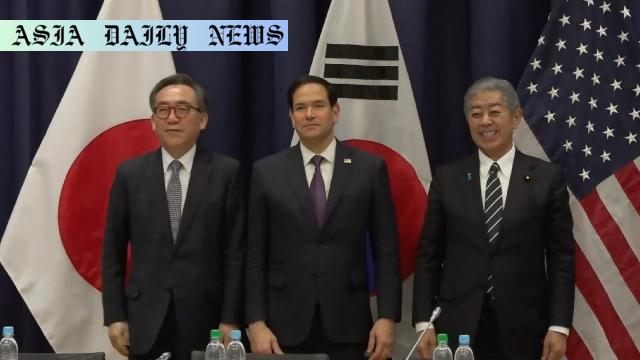Trilateral Cooperation: Japan, US, and South Korea join forces to address security, denuclearization, and regional stability.

Strengthening Trilateral Cooperation in Security
The foreign ministers of Japan, the United States, and South Korea recently convened in Germany to discuss strengthening their trilateral cooperation. This meeting marked the first significant collaboration since US President Donald Trump assumed office. The leaders emphasized the need for closer ties to ensure peace and stability in the region, highlighting the importance of united solutions in addressing global security challenges.
Opposition to Coercion in the Indo-Pacific
One of the key outcomes of the meeting was a strong, unified stance against unilateral actions aimed at altering the status quo in the Indo-Pacific. While not explicitly mentioned, the focus on the region and peace in the Taiwan Strait clearly pointed towards concerns about China’s growing assertiveness. The foreign ministers reiterated their shared commitment to ensuring the rule of law and stability in this strategically significant region.
Joint Efforts Toward Denuclearization
Nuclear disarmament of North Korea remained at the forefront of discussions. The ministers expressed shared apprehensions about North Korea’s advancing nuclear missile programs and the recent increase in its military collaboration with Russia. By aligning their policies, the three nations aim to bolster efforts toward achieving the denuclearization of the Korean Peninsula.
Energy Cooperation for Regional Stability
In addition to security concerns, the leaders discussed energy cooperation as a cornerstone of regional stability. Japan, South Korea, and the US explored strategies to leverage the abundance of liquefied natural gas (LNG) produced by the US. Strengthening energy ties helps mitigate reliance on unpredictable global markets and provides a secure energy supply chain across the three nations.
Shared Commitment to Global Peace
The historic meeting underscored a shared belief in fostering peace and prosperity. The foreign ministers expressed a commitment to working together not just for regional stability but also for broader global challenges. These collaborative efforts are expected to set a framework for addressing emerging threats, promoting sustainable development, and consolidating partnerships across sectors in the years to come.
The Joint Statement of Unity
A joint statement issued after the meeting encapsulated the discussions and agreements. It outlined a practical approach to addressing key issues, focusing on unity, economic collaboration, and strategic defense measures. By demonstrating their commitment on paper, the three nations solidify their position as crucial allies in the fight against authoritarianism and instability. Moving forward, the success of these collaborative efforts will depend on consistent dialogue and actionable plans.
Commentary
The Growing Importance of Trilateral Cooperation
The meeting between the foreign ministers of Japan, the United States, and South Korea highlights the increasing need for collaborative global leadership in addressing pressing challenges. With heightened tensions in the Indo-Pacific and broader security concerns, a united front offers a more robust response to potential threats. Such alliances are not merely symbolic; they ensure a coordinated approach, particularly in regions experiencing frequent geopolitical shifts.
Tackling Shared Challenges
The importance of maintaining peace in the Taiwan Strait and countering North Korea’s nuclear ambitions underscores the urgency of the trilateral partnership. As global powers, Japan, South Korea, and the United States carry a responsibility to promote regional security while upholding international norms. These shared objectives reflect a growing acknowledgment that collaboration is instrumental in achieving sustainable peace.
Energy as a Strategic Asset
Beyond security, the focus on energy cooperation offers a promising avenue for long-term collaboration. Leveraging the US’s position as a leading LNG producer, the three countries can establish a stable and reliable energy grid. This move not only strengthens their economies but also decreases reliance on potentially volatile global energy markets.
Looking Ahead
While this meeting establishes a framework for deeper trilateral cooperation, the real test lies in translating agreements into tangible actions. For lasting impact, the three nations must continuously adapt to evolving dynamics and honor their commitments to mutual support. As they progress, their partnership could serve as a model for other nations seeking to balance power and mutual respect in addressing global issues.


